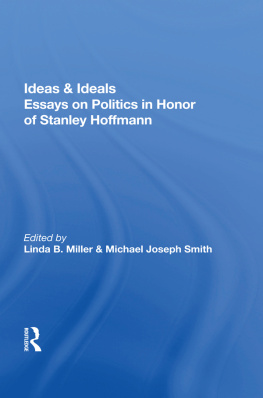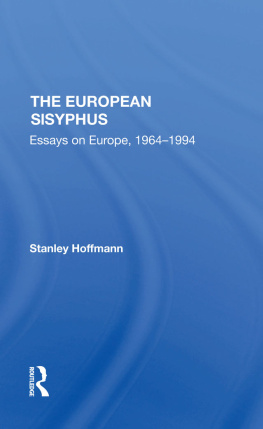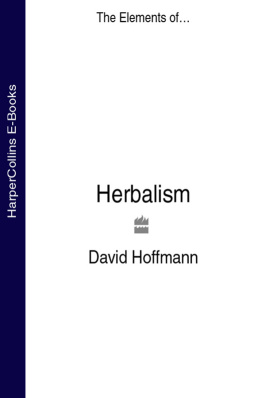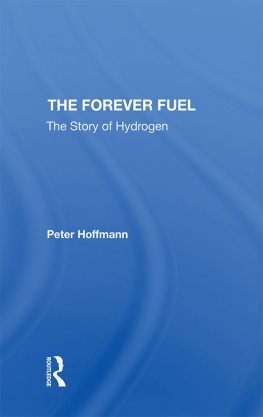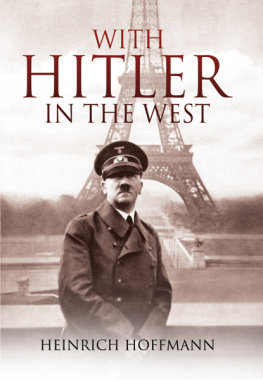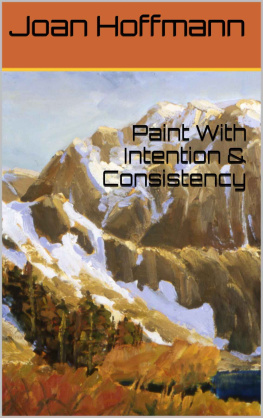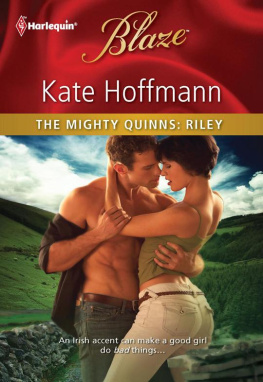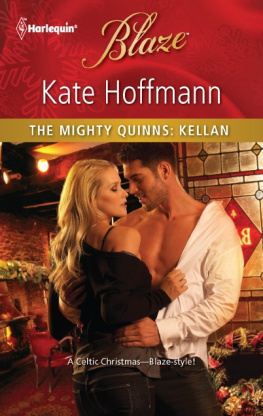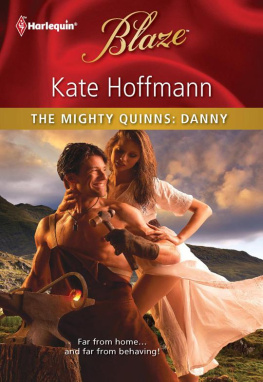Ideas and Ideals

Stanley Hoffmann.
First published 1991 by Westview Press
Published 2018 by Routledge
52 Vanderbilt Avenue, New York, NY 10017
2 Park Square, Milton Park, Abingdon, Oxon OX14 4RN
Routledge is an imprint of the Taylor & Francis Group, an informa business
Copyright 1991 by Taylor & Francis
All rights reserved. No part of this book may be reprinted or reproduced or utilised in any form or by any electronic, mechanical, or other means, now known or hereafter invented, including photocopying and recording, or in any information storage or retrieval system, without permission in writing from the publishers.
Notice:
Product or corporate names may be trademarks or registered trademarks, and are used only for identification and explanation without intent to infringe.
Library of Congress Cataloging-in-Publication Data
Ideas and ideals : essays on politics in honor of Stanley Hoffmann
[edited by] Linda B. Miller and Michael Joseph Smith.
P. cm.
Includes bibliographical references and index.
ISBN 0-8133-1286-8
1. International relations. 2. FranceForeign relations1945-
3. Hoffmann, Stanley. I. Hoffmann, Stanley. II. Miller, Linda B.
III. Smith, Michael Joseph, 1951
JX1391.134 1993
327dc20
93-19809
CIP
ISBN 13: 978-0367-00409-5 (hbk)
For Judith
Shklar 19281992
Contents
PART ONE
PERSPECTIVES ON TEACHING AND SCHOLARSHIP
, Stanley Hoffmann
, Stanley Hoffmann
, Michael Joseph Smith and Linda B. Miller
, Judith N. Shklar
, Hugh Collins
, Diana Pinto
PART TWO
MANAGING THE UNMANAGEABLE: CHOICES IN AN ANARCHIC MILIEU
, Robert O. Keohane
Josef Joffe
, Joseph S. Nye, Jr.
, J. Bryan Hehir
, Saadia Touval
PART THREE
STATE AND SOCIETY: CHANGE AND CONSTRAINTS
, Peter Gourevitch
, John T.S. Keeler
, Janice McCormick
, Michael Mandelbaum
, Ellen Frost
PART FOUR
RECAPTURING THE PAST: BELIEFS AND BELIEVERS
, Tony Smith
, Daniel Sherman
, Yuen Foong Khong
, Suzanne Berger
PART FIVE
IMAGINING ALTERNATIVE FUTURES
, Anne Saadah
, Mona Harrington
, Frauds A. Boyle
Miles Kahler
Traditionally, a festschrift is long in planning and execution, and ours is no exception. We conceived the book and invited contributions as the Soviet empire was collapsing in Eastern Europe. Authors submitted first drafts as the Gulf war loomed and rewrote their chapters as the Soviet Union ceased to exist, as German unification created new problems for both policymakers and observers, and as nationalism in much of Europe turned xenophobic. Revisions continued as the former Yugoslav republics lapsed into brutal conflict. Production of the volume accelerated as the last of the American Cold War presidents intervened in Somalia on terms that pointed toward changing the rules of the game for international organizations in the post-Cold War era. Final revisions followed the resounding defeat of the Socialists in the French legislative elections.
In trying to analyze these new challenges for both domestic and international politics, we were better able to appreciate the spectacular insights of Stanley Hoffmann, whom we honor with this collection. Ever generous with his time and energy and ever loyal to those whose careers he guided by example, Stanley participated actively in selecting the contributors and in helping to define the scope of the book. No stranger to turmoil in his youth, Stanley has spent his adult life coming to terms with it, as he reveals in his two autobiographical essaysa very rare occurrence for a festschrift!
Stanley insisted on two conditions that have enriched the book. First, he wanted half of the essays to concentrate on France, as he continues to spend at least half of his time on that most elusive of countries for scholars. Second, he forbade elaborate exegesis of his own enormous bibliography. The latter stipulation was difficult to respect, for his voluminous writings on international relations, American foreign policy, European politics, French history and political thought, leadership, and ethics have stood the harshest tests of time. Yet, paradoxically, his insistence that each of us develop an individual voice gives the book its coherence.
If Stanleys work were less encyclopedic, less brilliant, less path-breaking, or less provocative, our task would have been simpler. Similarly, if he had cared less about us during our formative years, when he helped us make the transition from college or graduate school to scholarly maturity, the list of contributors would have been shorter.
For much of his journey at Harvard, Stanley was fortunate to have the intellectual and personal friendship of the irreplaceable Dita Shklar. Her candid essay is the enduring legacy of her constant encouragement of this project. Tragically, she did not live to see its publication. It is with great affection and a great sense of loss that we dedicate the volume to her.
We are grateful to many other people whose moral support and technical skill are evident on every page. Jacqueline Brown located former students scattered on four continents. Jennifer Knerr of Westview Press cheerfully supervised the volume from its acquisition to its appearance; Jennifer Watson and Polly Christensen coped enthusiastically with the myriad details of production and design. Penelope Foran prepared the manuscript with consummate warmth, tact, and finesse. Our families and friends maintained their interest and sustained our own as coordination between Cape Cod and Colorado, Virginia and Australia became institutionalized.
Of course, our largest debt is to Stanley for overcoming his natural modesty when presented with the idea of a festschrift , for suggesting our collaboration as coeditors, and for embodying the ideal of teacher-scholar that we strive to emulate.
Linda B. Miller
South Wellfleet, Mass .
Michael Joseph Smith
Charlottesville, Va.
Part One
Perspectives on Teaching and Scholarship
1
A Retrospective on World Politics
STANLEY HOFFMANN
It wasnt I who chose to study world politics. World politics forced themselves on me at a very early age. I was born in Vienna at the end of 1928. However, as I explain in the next essay, I was brought up in France, in the 1930s, by an Austrian mother who disliked her native country (although not to the point of ever giving up her nationality!) and, like so many Central Europeans, preferred the South of France (Nice). But her brothers and their families had remained in Vienna; and they were Jews (converted or not). My first political memory is quite vivid. My mother and I (age 5) were in the garden of a lovely hotel in Vencea hotel that later became a convent, a garden that now shelters Matisses ethereal chapel. She opened the newspaper and found out about the assassination of Austrias Chancellor Dollfuss by the Nazis (July 1934). She turned to me and said that this was the beginning of the end for Austriaand for her family.

